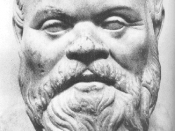Of all the facilities humankind has developed in its timely history, language has been, is and will continue to be the one attribute that sets us apart from all other intelligence. The ability to communicate clearly with each other is so important and beneficial, yet vastly overlooked and grossly misused. As intelligent beings, we all have choices that need to be made, and motives behind our decisions; however, it is language that allows us to communicate, defend, and justify the outcomes of those conclusions. The problem with humans is that the capability of language is constantly used to feed egoistic emotional desires. We have this gift that when utilized sincerely allows us to be rational, respectful, and virtuous; however, feelings drive us to use this function in a greedy, shameful, and immoral manner.
There is a stark difference between the two methods, but what brings them together is that they both fall under the guise of rhetoric.
Simply stated, rhetoric is the use of language in a specific manner. Socrates identified two forms of rhetoric: philosophical rhetoric and base rhetoric, otherwise known as flattery. The first form aims to discover what is true and false without regard for any advantages or disadvantages. The second form, flattery, aims at persuading others regardless of the truth; it is ultimately the pursuit of one's self-interest.
Choosing a specific way to live is not a black and white issue, and we can see this fact present in all of Socrates' dialectic opponents. When he faces off against Gorgias,
the two commence their war of words by exploring the moral foundations of law and society, but what is really at stake is what is meant to live a good life. Socrates preaches a life of reflection; he believes that one should examine every...



Rhetoric in language.
Nicely written and are very infomative.
1 out of 1 people found this comment useful.